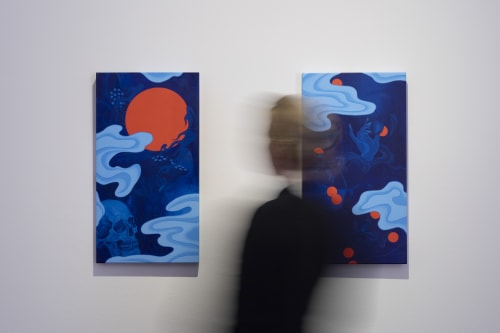The third culture individual is a sociological term to describe those born of one culture yet are raise in another, resulting in a uniquely self-directed establishment and development of an identity.
Initially referring to children of expatriate working professionals, the term is now globally applied to anyone brought up between worlds. No dust left in the lilies is Louise Zhang's most significant solo exhibition to date and represents a new thematic direction for her practice. Born in Sydney. Zhang has long mused on life as a third culture individual through an artistic practice spanning painting, sculpture and installation. Where previous bodies of work have abstractly explored an anxious otherness of identity, this exhibition explicitly wrestles with her family; specifically themes of religion, spiritual bonds and responsibility.
The exhibition's title alludes to an aftermath: what remains when structures are demolished in preparation for new beginnings. The perennial lily aptly symbolises rebirth and longevity as Zhang deconstructs conflicting cultural, political and religious influences present in her life. Zhang adopts cultural symbols from Chinese mythology to create ethereal vistas depicted in an alluring palette of playful pastels, underscored with dramatic, unsettling hues of western horror cinema.
Zhang explores the idea of the afterlife across several works exhibited in No dust left in the lilies. Like many migrant children, Zhang was raised adjacent to religion, with the Chinese Christian church acting as a community network. Chinese Christianity combines parts of Catholicism and Protestantism alongside various features of folk religion, existing with paradoxical inclusions; such as ancestor worship. It is within this hybridisation that Zhang operates, understanding the social role of religion for migrant communities while criticising institutional control over practitioners through moralistic fear mongering. This sense of power informs Spire (2023), a politically charged installation which both sympathises with the oppressed Christian population of Wenzhou by the Communist Party of China and expresses a desire to see the system dismantled by rendering the church belfry in a hellish, burning red.
Occupying the ground floor gallery is an architectural installation that combines the shape of a paifang gate adorned with roofing modelled from the Zhang family temple on Qidu, an island located within Wenzhou, China. Temple (2023) stands as a ghost, silhouetted in gothic black paint. Its shape is a haunting spectre, built from the artist's memory and candid photo references from her family members in China. Zhang, herself, has never entered the actual building, forbidden by her Christian-abiding parents as antithetical to their faith. Through its recreation in the gallery, the artist attempts to rebuild what has been lost - a missing link between Zhang and her ancestors.
In search of the place between the clouds and mountains (2023) continues this search for ancestral understanding with the artist reflecting on her grandfather. This allegorical painting touches upon familial duty, referencing Buddhist iconography alongside mythological symbolism. Living his entire life in China, Louise's grandfather observed traditional practices and held superstitious cultural beliefs, despite the growing influence of Christianity in his home. This painting, along with all of the works in No dust left in the lilies, acts as an homage and facilitates otherworldly conversations between family across spiritual worlds. Through her expansive body of work, the artist continues her journey in search of solace and discovery of self, amongst the lilies.

